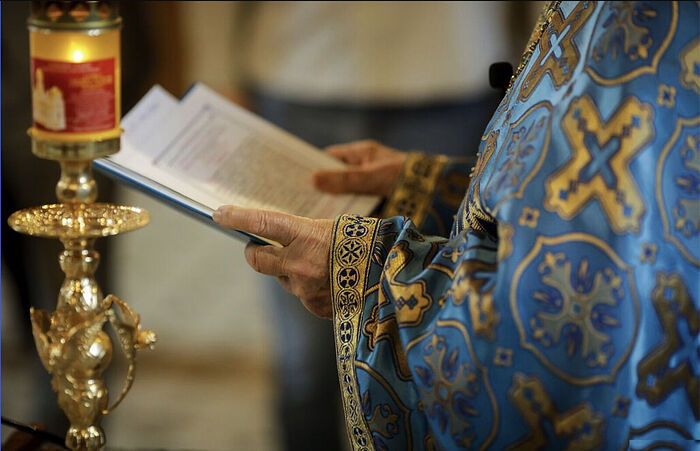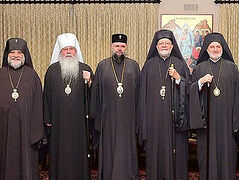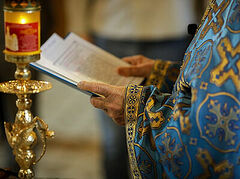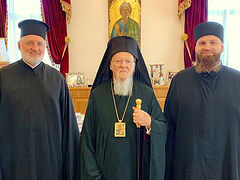Trenton, New Jersey, December 22, 2023
Multiple Orthodox jurisdictions operating within the U.S. recently filed an amicus brief to a case before the Supreme Court of New Jersey concerning a religious organization’s right and freedom to discipline, fire, or defrock a cleric for failing to live up to the organization’s standards.
The relevant legal doctrine, known as the ministerial exception, protects a religious institution from the application of anti-discrimination laws concerning its employment relationship with its ministers.
As stated in the brief filed by the Diocese of Eastern America of the Serbian Orthodox Church, the Eastern American Diocese of the Russian Orthodox Church Outside of Russia, the Romanian Orthodox Metropolia of the Americas, and the Antiochian Orthodox Christian Archdiocese of North America, “This mandate necessarily requires ensuring that their ministers, who are ‘the chief instrument by which the Church seeks to fulfill its purpose,’ remain worthy of that weighty responsibility.”
“Amici have a strong interest in this case because they regularly rely upon the constitutional protections afforded by the ministerial exception as they carry out their spiritual mandate to form the faithful entrusted to their care,” the brief states.
In fact, the ministerial exception is at the heart of the case that Alexander Belya has brought against the Russian Orthodox Church Outside of Russia. Formerly an archimandrite within ROCOR, Belya was canonically defrocked when, in the summer of 2019, he sent a falsified letter from His Eminence Metropolitan Hilarion (Kapral), then the First Hierarch of ROCOR, to the Holy Synod of the Moscow Patriarchate, requesting that he be confirmed to become a bishop.
Belya brought suit against his former jurisdiction, claiming that an internal document contesting his supposed election as bishop and calling for him to be investigated on a number of serious charges constitutes defamation.
However, ROCOR’s legal team, the Becket Fund for Religious Liberty, argues that the ministerial exception and the related church-autonomy doctrine protect the Church’s right to discipline and defrock Belya and to discuss the matter internally.
Against this background, ROCOR and the other jurisdictions are interested in the latest case concerning the ministerial exception, Hyman v. Rosenbaum Yeshiva of New Jersey, which arose when the plaintiff, Rabbi Shlomo Hyman, was fired from the Rosenbaum Yeshiva after an investigation confirmed that he had inappropriately touched female students. Parents were then notified of his firing, which Hyman argues caused him to be labeled as a pedophile in the community. He then sued the yeshiva for defamation, among other things.
A judge in the Appellate Court rejected Hyman’s claims, stating: “Requiring a church to accept or retain an unwanted minister, or punishing a church for failing to do so, intrudes upon more than a mere employment decision. Such action interferes with the internal governance of the church, depriving the church of control over the selection of those who will personify its beliefs.”
And in their amicus brief, the four filing Orthodox jurisdictions call upon the New Jersey State Court to uphold the Appellate Court’s ruling.
The brief argues that while the ministerial exception safeguards all faith traditions, it is “even more essential to protect minority religious groups whose beliefs and practices may be unfamiliar or not widely held.”
The document provides a hypothetical example:
For example, these [Orthodox] Churches are characterized by a rich monastic tradition permeated with practices unfamiliar to civil courts. Under that tradition, monks are subject to any rule established by their abbot, who serves as the leader of that monastery and often provides various spiritual disciplines to those under his care. These rules of spiritual discipline can include anything from strict fasting regimens to prescribed work assignments.
If a disgruntled monk could repackage disagreements over these disciplinary practices as a mere tort, it is unlikely that any judge would be familiar with or fully appreciate this less familiar practice of the Eastern Orthodox Churches. And it would expose those beliefs to judicial second-guessing by an unfamiliar court that might misunderstand those beliefs or confuse them with beliefs and practices that are interpreted differently among similar religious communities.
Furthermore, were the Supreme Court to overturn the Appellate Court ruling, minority religious groups would be pressured to define “religious activity” and their own self-understanding “in part by the prospects of litigation” rather than by their sincerely held religious beliefs.
Follow OrthoChristian on Twitter, Vkontakte, Telegram, WhatsApp, MeWe, and Gab!




